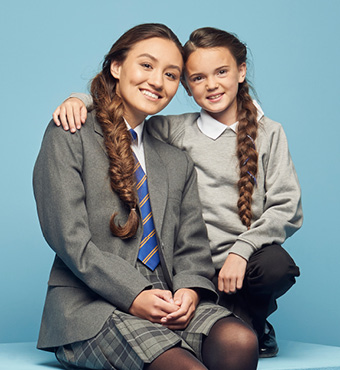- UNIFORM BY SCHOOL
- Girls School Uniform
- Boys School Uniform
- Skirts
- Boys Trousers
- Girls Trousers
- Polo Shirts
- Blouses
- Shirts
- Blazers
- PE Kit
- Clearance


Girls School Uniform


Boys School Uniform


FREE delivery - Ends Monday at Midnight
(X)







Plastic Free July
Plastic Free July® is a global movement that helps millions of people be part of the solution to plastic pollution – so we can have cleaner streets, oceans, and communities.
Over the past few years, we’ve all become more aware of the impact plastics have on the environment. Shows such as Blue Planet highlighted just how much single-use plastics have damaged the world’s ecosystems, and people, companies and schools are taking action to reduce and remove single-use plastics from our everyday lives.
As a country, we’ve made great progress in reducing the ‘top four’ single-use plastics – plastic bags, plastic bottles, takeaway coffee cups and plastic straws – but there’s more we can do. Over 300million tonnes of plastic are made each year, and half of this is single-use.
plasticfreejuly.org has loads of ideas to get you started on reducing your plastics use.
Here are a few that you might find helpful if you have kids.
Children’s parties
When it comes to children’s parties, it’s all too easy to end up with loads of single-use plastic waste. Decorations, party bags, plastics cups and plates, balloons and wrapping paper all add up to a lot of black bin bags being filled at the end of it and going straight to landfill.
While it’s tempting to buy cheap plastic items online, it’s not that much more effort to use non-plastic decorations, plus you can get your kids involved too.
Bunting is really easy to make – you just need some string and either scraps of material or paper to decorate in a theme of your choice. Kids can also make origami decorations or pom poms with scraps of wool, and the great thing about these is they can be used again or repurposed for another crafting project or party.
When handing out party bags, you can use paper bags, wrap birthday cake in paper napkins and avoid giving individually wrapped sweets. Just buy a large bag of sweets or biscuits and drop some in loose – kids won’t mind. You can even include a re-usable straw or cup in the party bag so they have something to keep and use again.
Instead of disposable cups, plates and cutlery, use reusable items. If you don’t have enough of your own, club together with some other parents to borrow and swap. Instead of using individual bottles of juice or pop, fill a big jug instead.
Packed lunches
There’s lots we can do to help reduce our use of single-use plastics, especially with our kids at school. If you look at packed lunch boxes, there can be a lot of plastic waste. It doesn’t need to be the case though and you can make some easy swaps that’ll save on plastics and money.
Instead of plastic sandwich bags use beeswax paper or you can easily buy reusable sandwich wrappers that can be washed.
Buying in bulk can help too – instead of buying individually wrapped snack bars and crisps, buy larger packs and put in in a reusable bag or just leave it loose in the container. You can buy special lunch boxes that have individual sections if your kids don’t like their food touching.
Finally, invest in reusable water bottles – 7.7 billion plastic water bottles are used every year in the UK. By giving your child a reusable bottle instead, you can help reduce this.
School uniform
Another area where you can choose to reduce plastic waste is to look at your children’s school clothes. What materials are they made from? How much plastic packaging to they come in and how often are you having to replace them due to wear and tear?
Our durable uniform is designed using sustainably sourced fabrics, ensuring the impact to the environment is as low as possible.
If you have uniform that no longer fits your kids, rather than throwing it out, hold a swap shop with friends and classmates or donate them to a school uniform bank.
You don’t need to abandon plastics all at once – get to know what plastics you’re using daily and over time pick one to swap out with an alternative.
Get your childrens’ school involved too; by helping their class to reduce plastic waste, you’ll be helping to reduce the impact of plastic waste by hundreds or thousands.

